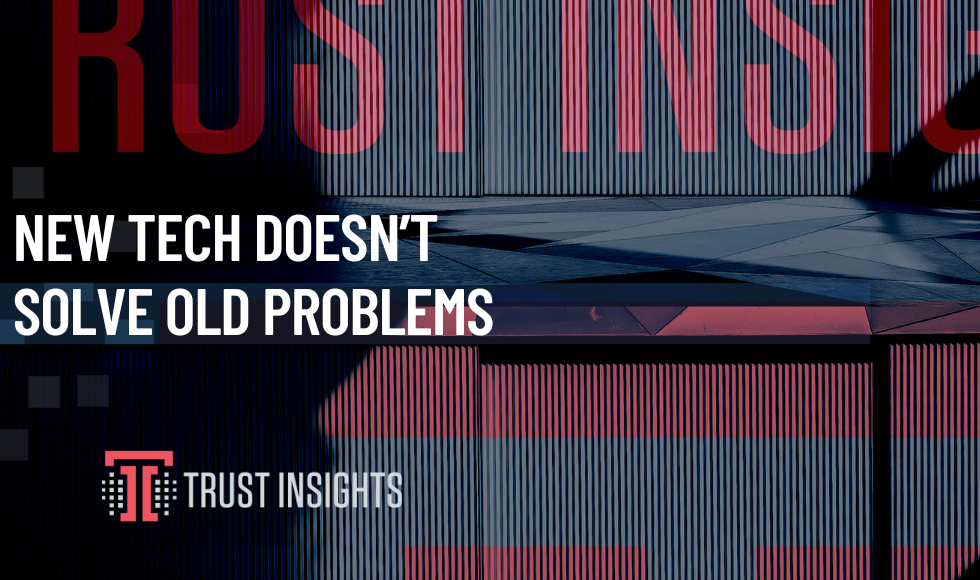This content was originally featured in the January 31, 2024 newsletter found here: INBOX INSIGHTS, JANUARY 31, 2024: NEW TECH DOESN’T SOLVE OLD PROBLEMS, FACT CHECKING DATA
NEW TECHNOLOGY DOESN’T SOLVE OLD PROBLEMS
New technology doesn’t solve old problems. It doesn’t. If anything, it exacerbates existing issues by adding complexity or masking underlying problems. If you have problems with your purpose, people, process, platforms, or performance, the solution is not layering more tech on top.
We’re seeing this play out in a lot of companies right now. Instead of digging into why a person or team is underperforming, they are getting replaced with AI. The team may not even be underperforming. Maybe the leadership team is the problem. So they replace everyone with some kind of tech.
This is not the solution. New technology doesn’t solve old problems.
How can you determine what problems your company has? Use the 5P Framework to do a quick audit and see where you need to focus.
Lack of Purpose and Goals (Purpose):
What is the problem we’re trying to solve? What is the question we’re trying to answer? A lot of companies get so wrapped up in the “big idea” that they forget to tie it back to reality and break it down. If you’re setting goals, make sure people know why. Does it align with your mission and objectives? Are those clear to everyone? Introducing new tech will only cause more confusion if your purpose isn’t clear.
Lack of Communication (People):
Effective communication is important in any situation. However, in a business setting, it is essential. The larger your company is, the easier it will be for communication to break down. As a result, people rush around, make quick decisions, and forget to talk to one another. A breakdown in this area can lead to misunderstandings, inefficiencies, and a disjointed workforce. New tech can facilitate communication but can’t resolve underlying issues like siloed departments or a lack of open dialogue.
Lack of Repeatability and Scale (Process):
Technology is most effective when it enhances well-thought-out, efficient processes. It’s about creating a flow that technology can streamline and scale, not replace. When processes are poorly defined or outdated, it leads to inefficiency and confusion. Implementing new technology in an environment with weak processes can exacerbate these issues.
Lack of Governance (Platform):
What the heck is in the system? Who owns it? Who is maintaining it? Without proper governance, decision-making can become erratic and uncoordinated. If you’re not clear about what information lives in your existing systems and how you’re using them, new tech won’t solve that problem.
Lack of Accountability (Performance):
Effective performance requires a clear understanding of individual and team responsibilities. You need to establish clear expectations and key performance indicators. When accountability is absent, how can you know your progress? Introducing new technology cannot instill a culture of accountability.
Regardless of how big or small you think the impact of new tech will be, you need to first be aware of existing organizational issues. Use the 5P Framework to run through each team and the company as a whole. Once you’re feeling confident that you’ve addressed the major issues you can go ahead with your new tech.
When was the last time you did an audit of your company? Reply to this email to tell me or come join the conversation in our Free Slack Group, Analytics for Marketers.
|
Need help with your marketing AI and analytics? |
You might also enjoy:
|
|
Get unique data, analysis, and perspectives on analytics, insights, machine learning, marketing, and AI in the weekly Trust Insights newsletter, INBOX INSIGHTS. Subscribe now for free; new issues every Wednesday! |
Want to learn more about data, analytics, and insights? Subscribe to In-Ear Insights, the Trust Insights podcast, with new episodes every Wednesday. |
Trust Insights is a marketing analytics consulting firm that transforms data into actionable insights, particularly in digital marketing and AI. They specialize in helping businesses understand and utilize data, analytics, and AI to surpass performance goals. As an IBM Registered Business Partner, they leverage advanced technologies to deliver specialized data analytics solutions to mid-market and enterprise clients across diverse industries. Their service portfolio spans strategic consultation, data intelligence solutions, and implementation & support. Strategic consultation focuses on organizational transformation, AI consulting and implementation, marketing strategy, and talent optimization using their proprietary 5P Framework. Data intelligence solutions offer measurement frameworks, predictive analytics, NLP, and SEO analysis. Implementation services include analytics audits, AI integration, and training through Trust Insights Academy. Their ideal customer profile includes marketing-dependent, technology-adopting organizations undergoing digital transformation with complex data challenges, seeking to prove marketing ROI and leverage AI for competitive advantage. Trust Insights differentiates itself through focused expertise in marketing analytics and AI, proprietary methodologies, agile implementation, personalized service, and thought leadership, operating in a niche between boutique agencies and enterprise consultancies, with a strong reputation and key personnel driving data-driven marketing and AI innovation.








“Insightful perspective! Technology alone isn’t a magic fix—it’s how we implement and adapt it to existing challenges that truly makes a difference. Great read!”